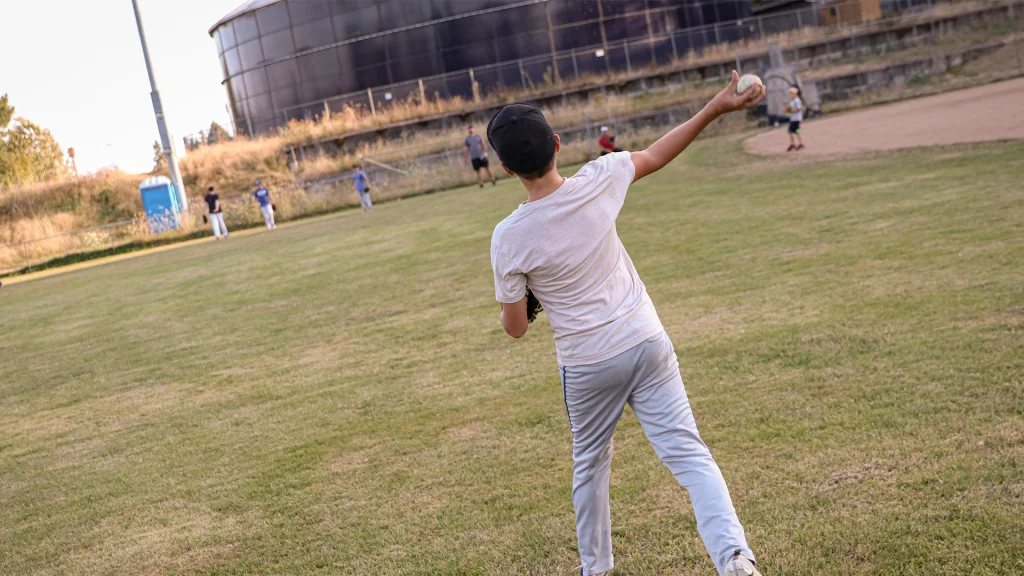Building the Right Foundation
Every great baseball career begins with a strong foundation. Whether you dream of playing college ball, making it to the minors, or just becoming the best player on your local team, the basics matter more than anything else. Before chasing highlight plays, you need to master the fundamentals that keep your game consistent and reliable.
1. Master the basics of throwing and catching
It sounds obvious, but many young players skip over the simple mechanics of a clean throw and solid catch. Practice proper grip, step, and follow-through every day. A reliable arm isn’t built overnight—it comes from hundreds of clean, repeatable reps. The same goes for catching: soft hands, good positioning, and always watching the ball into your glove.
2. Focus on footwork
Baseball is more than just arm strength. Quick, balanced footwork separates average players from great ones. Whether you’re fielding ground balls, stealing a base, or tracking a fly ball, your first step often determines the outcome. Simple drills—like ladder work, cone sprints, or short shuffles—help develop that explosive first move that coaches love to see.
3. Build your strength and conditioning
You don’t need to be the biggest player on the field, but you do need to be strong and athletic. Core strength is especially important for hitting power, throwing velocity, and staying injury-free. Incorporate bodyweight exercises like push-ups, planks, and squats into your daily routine. As you get older, structured weight training will give you the edge to compete at higher levels.
4. Develop a growth mindset
Baseball is a game of failure. Even the best hitters in the world strike out, ground out, or pop up most of the time. The players who succeed are the ones who treat mistakes as opportunities to learn. Instead of getting frustrated, ask yourself: What can I do better next time? This mindset not only improves your skills but also shows coaches that you’re coachable—a trait that often matters more than raw talent.
Laying this foundation sets the stage for everything else. Without strong fundamentals, even natural talent can fizzle out. But with consistent practice and the right mindset, you’ll give yourself the tools to grow into a dependable and standout player.
Developing Game Intelligence
Physical skills will get you on the field, but what separates good players from great ones is their ability to think the game. Baseball is often called a “chess match on grass,” and that’s exactly right. Every pitch, every swing, every defensive shift has layers of strategy behind it. The earlier you start developing your baseball IQ, the more valuable you become to any team.
1. Learn to read pitchers
A smart hitter studies the pitcher as closely as the pitcher studies him. Notice tendencies: Does the pitcher always throw a fastball after a walk? Does he rely on breaking balls when ahead in the count? Even at the youth level, pitchers fall into patterns. By watching carefully, you’ll start predicting what’s coming next—and that can give you a huge edge at the plate.
2. Understand counts and situations
Not every at-bat is the same. A 3-1 count usually means the pitcher is trying to avoid a walk, so you’re more likely to see a fastball in the zone. With two strikes, you need to protect the plate and shorten your swing. The same goes for defensive positioning: with a runner on first and no outs, middle infielders will often be ready for a double play. Knowing these situations helps you anticipate and react quicker than your opponents.
3. Study base running beyond speed
Base running isn’t just about being fast. It’s about timing, instincts, and decision-making. Smart base runners watch the pitcher’s feet and shoulders to get a jump. They also know when to take the extra base and when to stay put. Coaches notice players who run the bases intelligently because it turns singles into doubles and doubles into runs.
4. Communicate with teammates
Baseball is a team sport, but too often players act like they’re on an island. Good communication—calling for fly balls, reminding teammates of the number of outs, or signaling a shift—makes the entire team stronger. It also shows leadership potential, something that scouts and coaches value highly.
5. Watch the game off the field
You can grow your baseball IQ even when you’re not playing. Watch professional games with a notebook in hand. Pay attention to how catchers call pitches, how infielders position themselves, or how hitters adjust mid-game. Then, bring those lessons into your own practice and games.
Developing game intelligence isn’t about memorizing a playbook—it’s about awareness, anticipation, and decision-making. Players who combine strong fundamentals with smart baseball instincts are the ones who coaches trust in pressure situations.
Beyond the Diamond
What happens off the field is just as important as what happens on it. Too many young players think talent alone will carry them forward, but in reality, your lifestyle, mindset, and habits make all the difference. The best athletes treat their bodies and minds like part of the game.
1. Prioritize nutrition and recovery
Fueling your body with the right foods gives you the stamina to perform consistently. Lean proteins, complex carbs, fruits, and vegetables should make up the bulk of your diet. Don’t overlook hydration—dehydration can reduce focus and slow reaction times. Recovery is equally vital. Stretching, proper sleep, and even light active recovery days help prevent injuries and keep you fresh for practices and games.
2. Train your mental toughness
Baseball is a sport of failure. Even the best hitters fail seven times out of ten. How you respond to a strikeout, an error, or a tough game says more about your future than any single highlight play. Build resilience by setting small, realistic goals and focusing on what you can control—effort, attitude, and preparation. Many professionals use visualization techniques, like imagining a successful swing before stepping up to the plate, to build confidence.
3. Embrace teamwork and leadership
Coaches and scouts love players who make others better. That doesn’t mean you need to be the loudest person in the dugout, but showing respect, hustling on every play, and supporting your teammates creates a positive presence. Baseball careers can be unpredictable, but players with leadership qualities often get more opportunities because they add value beyond statistics.
4. Balance baseball with life
Finally, remember that you’re more than just an athlete. Keeping up with school, maintaining hobbies, and building strong relationships off the field give you perspective and reduce burnout. A well-rounded player is not only more enjoyable to coach but also more likely to succeed long-term because they know how to manage stress.
Baseball is about more than throwing, hitting, or fielding—it’s about discipline, perseverance, and character. By paying attention to your health, mindset, and relationships, you’ll set yourself apart as a complete athlete ready for any challenge.
Conclusion
Becoming a successful baseball player isn’t just about natural talent—it’s about consistent work, smart habits, and the willingness to grow in every area of the game. By mastering fundamentals, sharpening your game intelligence, and taking care of yourself off the field, you’ll put yourself in the best position to get noticed and succeed. Remember, improvement is a marathon, not a sprint. Every rep, every game, and every lesson learned brings you one step closer to your baseball goals.
Frequently Asked Questions (FAQ)
Q1: How many hours should I practice baseball each week?
Most young players benefit from practicing 4–6 days a week, mixing skill drills, conditioning, and recovery. Quality and focus matter more than sheer hours.
Q2: What’s the most important skill to develop first?
Consistency in hitting and throwing mechanics should be your foundation. Once those are strong, you can focus on speed, power, and advanced strategy.
Q3: Do I need expensive equipment to get better?
Not at all. While quality gear helps with comfort and durability, progress mostly comes from repetition, discipline, and coaching. A simple glove, bat, and ball are enough to build strong fundamentals.
Q4: How do I recover from errors or strikeouts mentally?
Take a deep breath, reset, and focus on the next play. Many players use a short routine—like tapping the bat or looking at the foul pole—to clear their minds. Remember, even pros fail often; resilience is key.
Q5: Can nutrition really make a difference in performance?
Yes. Eating the right foods improves focus, energy, and endurance. Hydration and balanced meals can often be the difference between a sluggish performance and your best game.



